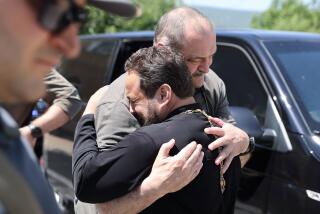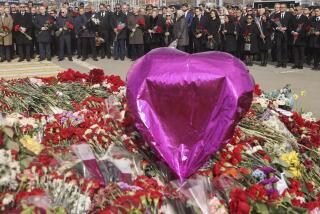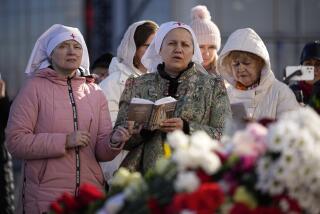23 Killed as Uzbek Police Seek Militants
MOSCOW — Twenty alleged Islamic militants and three policemen died in the Central Asian nation of Uzbekistan on Tuesday in an apartment shootout that ended when the suspects blew themselves up, authorities said.
The incident in Tashkent, the capital, began when police attempted to check the documents of people gathered in the apartment, Uzbek Interior Ministry spokesman Aziz Ernazarov said by telephone. It raised to 42 the death toll in a series of explosions and clashes between police and suspected militants that began Sunday night, he said.
“The destructive actions have been committed by dark forces who dislike the independence of our country and peaceful life of our people,” Uzbek President Islam Karimov said on state television, the Russian news agency Itar-Tass reported. “The forces wanted to break peace, destroy the situation and sow panic and fear in our people’s hearts.”
The Uzbek government has blamed Islamic extremists for the violence, citing the banned group Hizb ut-Tahrir as a possible perpetrator. The group, whose name means Party of Liberation, espouses fundamentalist Islamic ideas and has used methods such as the distribution of anti-government leaflets to promote the establishment of a caliphate in Central Asia based on Islamic law. On Monday, the group denied responsibility for the violence in Uzbekistan.
Tuesday’s violence coincided with the release of a 319-page report by New York-based Human Rights Watch alleging that the Uzbek government has arrested and tortured thousands of nonviolent Muslim dissidents.
“What we’re worried about now is that the government will use these events as a pretext for another massive crackdown on nonviolent Muslims who practice their faith outside state control,” Acacia Shields, the group’s senior researcher on Central Asia, said in a telephone interview from Tashkent.
“The people they’ve declared to be their primary suspects seem to be just the usual suspects, people whom they already have an interest in arresting,” she said. “Our concern is that now again they’re going to use this to arrest people whose ideas they really don’t like, and who they want to punish for expressing those ideas.”
Shields said Hizb ut-Tahrir espouses ideas that may be seen as extreme, but that does not mean it is violent.
“They certainly take a position against democracy. They don’t respect human rights. Much of their literature is anti-Semitic,” she said. But “Hizb ut-Tahrir has never been linked to any violent acts and has said it would never use violence to achieve its goal of establishing a caliphate.”
Some observers said the Islamic Movement of Uzbekistan, which in the late 1990s clashed with the armed forces and has sought to overthrow Karimov, would be a more likely suspect in the recent violence. But Uzbek officials have claimed to have largely defeated that group.
On Tuesday, Russia’s state-run RTR television described Tashkent as if under siege, with intercity bus and commuter trains stopped and the streets largely empty and patrolled by police. Markets, kindergartens and day-care centers were shut down, according to RTR.
In Washington, State Department spokesman Richard Boucher said that Secretary of State Colin L. Powell had spoken with the Uzbek foreign minister and offered condolences. Powell also “offered U.S. assistance in the investigation, and the minister expressed appreciation for the offer, and our embassy in Uzbekistan will be following up.”
Uzbekistan has strongly supported U.S. anti-terrorism efforts in the region.
While noting that the U.S. wants to help Uzbekistan “in every way possible” as it faces the threat of terrorism, Boucher added that Washington had continued to press Uzbekistan on democracy and human rights.
“We have many partners in the war on terror with whom we continue to talk in a straightforward and quite forceful manner about democracy and taking steps toward democracy, because ultimately we believe the two go together,” he said.
Vitaly Ponomaryov, a Russian analyst specializing in Central Asia, said political and religious repression in Uzbekistan had fostered conditions for home-grown terrorism based on domestic issues.
“It is rather unlikely that the acts of terror were an act of retribution against Uzbekistan for its active support to the U.S. during the operation in Afghanistan,” he said. “It is quite possible that there are some people in Afghanistan who would be willing and happy to help settle scores with the Karimov regime.
“But it is clear as daylight that the initial impulse was coming from inside Uzbekistan.... The mass repressions prepared a very fertile soil for the growth of radical sentiments in Uzbekistan, and this is something that the Karimov administration has been warned many times about.”
There were conflicting reports on how Tuesday’s incident began. Wire services reported from Tashkent that there was a clash at a checkpoint. At least one explosion reportedly occurred, and suspects then fled to the apartment where the shootout occurred.
According to one report, two suspects jumped out of a car that was stopped by police and detonated explosives-packed belts, killing themselves and three officers.
But Russian state TV said a car had blown up near a checkpoint, and attackers then opened fire on the police.
According to two wire services, a resident named Farida said that in a separate incident nearby, a female suicide bomber blew herself up after being shot in the leg by police.
Ernazarov said Tuesday evening that to the best of his knowledge there had been no clashes outside the apartment and no explosions aside from the one there.
“When Interior Ministry officers showed up in order to check these people’s documents and establish their identities, the terrorists suddenly opened fire at the police,” he said. “Everything happened very unexpectedly. In the course of combat, all terrorists blew themselves up with hand grenades and possibly other explosives they possessed.
“There were no female suicide bombers among the terrorists,” he said, adding, “There were plenty of rumors of all sorts today, and we need to double-check them all.”
Alexei V. Kuznetsov of The Times’ Moscow Bureau contributed to this report.
More to Read
Sign up for Essential California
The most important California stories and recommendations in your inbox every morning.
You may occasionally receive promotional content from the Los Angeles Times.










